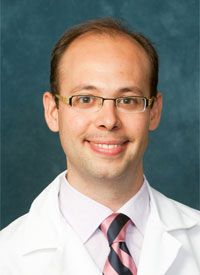One-Third of Colorectal Cancers Found Before Age 35 Are Hereditary
A study including the largest reported US cohort of patients under age 35 with colorectal cancer (CRC) has discovered that one-third of these patients suffer from hereditary forms of the disease.
Eduardo Vilar-Sanchez, MD, PhD

Eduardo Vilar-Sanchez, MD, PhD
A study1including the largest reported US cohort of patients under age 35 with colorectal cancer (CRC) has discovered that one-third of these patients suffer from hereditary forms of the diseasea finding that University of Texas MD Anderson Cancer Center researchers hope will prompt genetic counseling and testing in this underrepresented age group.
The study, published in theJournal of Clinical Oncology, focused on patients diagnosed at age 35 or younger, in order to better characterize the extent of hereditary CRC in this age group. The researchers examined data from 193 patients, under 35 years and diagnosed with CRC, who were evaluated by genetic counseling at MD Anderson between the years 2009 and 2013. Data were collected regarding demographics, clinicopathologic information, tumor and genetic testing, and family history. Researchers then compared patients with an identified hereditary cancer syndrome to those without one.
The study authors found that 35% of evaluable patients had an identifiable hereditary cancer syndrome, including 23 with Lynch syndrome, 22 with mutation-negative Lynch syndrome, 16 with familial adenomatous polyposis, 2 with constitutional mismatch repair deficiency, 2 with biallelicMUTYHmutations, and 1 with Li-Fraumeni syndrome.
They also noted that patients without a hereditary syndrome more commonly presented with disease in the metastatic stages, whereas patients with a hereditary syndrome presented at earlier stages of disease and had a family history of cancer. Nineteen percent of those patients with hereditary syndromes had no family history of CRC.
“We hope that physicians and other healthcare providers treating patients diagnosed with colorectal cancer under age 35 are aware of the high prevalence of hereditary cancer syndromes and will therefore send these patients for genetic counseling and consideration of genetic testing,” said corresponding author Eduardo Vilar-Sanchez, MD, PhD, assistant professor, cancer prevention and population sciences, The University of Texas MD Anderson Cancer Center, in an interview withTargeted Oncology.
Vilar-Sanchez also stated that oncologists should recommend counseling and testing to patients’ unaffected family members so that “undiagnosed carriers of hereditary syndromes with a genetic predisposition to cancer will potentially be detected, and these carriers will be able to engage in screening programs to detect early cancers.”
Healthcare professionals can help young individuals at risk for CRC to take measures to protect themselves. “Recommendations vary for the different [hereditary] syndromes. In general, a subsequent conversation between the patient and a genetics specialist should happen,” Vilar-Sanchez said.
Healthcare professionals can also recommend surveillance programs with periodic visits, physical exams, lab tests, endoscopies in the case of GI cancers, and sometimes even imaging studies, he stressed. “Also, risk-reducing surgeries or participation in prevention clinical trials that test natural compounds or other drugs are available to patients and families. There are active research programs looking at how lifestyle modifications and dietary interventions can help to reduce cancer risk in this population.”
The patient diagnosed with CRC will need additional recommendations for surveillance, as well as knowledge of how and what tests need to be conducted and with what frequency, according to Vilar-Sanchez. “Physicians may also recommend preventive measures, and a discussion about risk-reducing surgeries should be maintained between the patient and the medical provider,” he said.
Patients diagnosed with CRC at age 35 or younger face unique challenges related to disease aggressiveness, the impact of treatments on fertility, and potential genetic risks to family members, according to Vilar-Sanchez. These patients represent less than 1.5 percent of all cases.
Approximately 5% of all CRC cases are caused by hereditary syndromes, such as Lynch syndrome and familial adenomatous polyposis (FAP), according to an MD Anderson Cancer Center news release.2Among patients with early-onset CRC, the incidence of hereditary CRC tends to be higher, the release noted.
“It is true that the number of patients diagnosed with CRC under age 35 is relatively small, but the prevalence detected in our study of hereditary syndromes is 30%. Therefore, the potential target population is not small,” he said.
Unfortunately, he does not see this prevalence decreasing, noting other studies by investigators at MD Anderson, which indicate a growth CRC incidence in this younger population in the US is increasing, with estimations of 100% increase by 2030, further stressing the need for genetic counseling and testing.
References
1. Mork ME, You YN, Ying J, et al. High prevalence of hereditary cancer syndromes in adolescents and young adults with colorectal cancer.J Clin Oncol.2015 doi: 10.1200/JCO.2015.61.4503.
2. University of Texas MD Anderson Cancer Center. MD Anderson study finds one-third of colorectal cancers diagnosed before age 35 are hereditary.http://www.mdanderson.org/newsroom/news-releases/2015/study-one-third-colorectal-cancers-before-35-are-hereditary.html